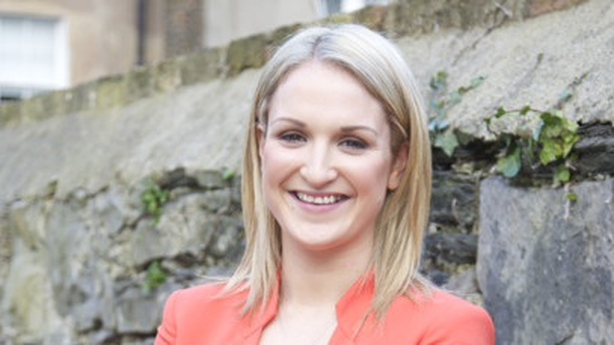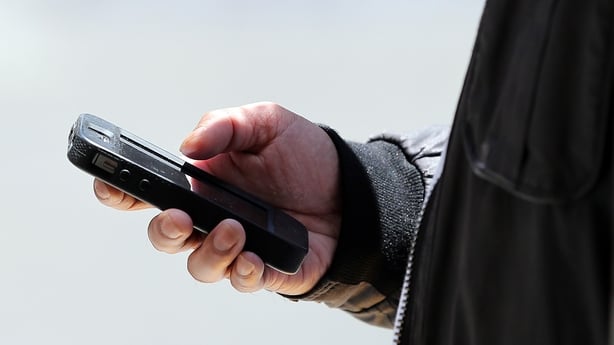Ailbhe Conneely on the debate over rural mobile and broadband services
Picture it if you will. You are in Co Meath.
There's something unusual, something strange happening around you.
People on mobile phones are randomly adopting curious stances.
There's nothing to fear from these contortions, but there's a chance you may find yourself posing in a similar fashion if you are seeking a mobile phone signal.

According to the Fine Gael Deputy Helen McEntee, some of her constituents are forced to stand on one leg, touch their nose and put their hand out the window in order to make a phone call.
You are forewarned.
Claims that the Royal County is not rich when it comes to mobile phone signals may come as a surprise to many.
However, it was evident from this week’s meeting of the Transport and Communications Committee that the people of Meath are not alone.
One by one, TDs voiced their constituents' frustrations to representatives of the Communications Regulator and the Department of Transport and Communications, who went before them on Wednesday to discuss the matter.
The irony wasn't lost on anyone as Com Reg's Chairperson made efforts to kick off proceedings with a powerpoint presentation.
Despite frantic mouse clicking, the technology refused to co-operate. Fianna Fáil's Timmy Dooley suggested "a broadband issue" may be responsible, which was met with welcome laughter around the room.
Once up and running, O'Brien's presentation - complete with graphs, pie charts and bar charts - noted that 97% of Irish households subscribe to mobile phone services and approximately 1.7 million households have "near universal availability of broadband".
In her presentation, Assistant Secretary of the Department of Communications Katherine Licken outlined the Government's eagerly anticipated National Broadband Plan, which aims to provide 100% of premises in Ireland with access to high-speed broadband.
Both ComReg and the Department eagerly mentioned that the roll out of 4G by mobile operators was under way.
However, younger members of the Committee appeared wary and were critical, with the aforementioned Deputy McEntee leading the charge.
She requested that mobile phone operators outline their geographical coverage rather than publicising their 99% population coverage noted in Kevin O'Brien's presentation.
Ms McEntee told the Committee that she requested her Facebook followers to inform her of broadband and mobile phone black spots particularly in Meath.
The response "was huge".
"Some of them even said they had to stand on one leg, touch their nose and put their hand out the window."
Deputy McEntee directed her comments to the Regulator.
"People's expectations are high because mobile phone companies are pretending to do the devil and all, and they're not doing it".
"You need to ensure that people know the service they are getting is correct", she warned.
 Her party colleague Patrick O'Donovan noted that the presentations by ComReg and the Department encouraged people to sign up to 4G.
Her party colleague Patrick O'Donovan noted that the presentations by ComReg and the Department encouraged people to sign up to 4G.
"In a lot of the places that I represent", the Limerick TD smirked, "we'd just like 'G'..because we have 'bogband' in a lot of cases. Dial up was actually faster than what we have in some areas."
Michael Colreavey of Sinn Féin (and of Sligo) noted Deputy McEntee's comments. He went one better.
"I know someone who has to leave his house and drive to a higher point to get a signal. That person is trying to run a business", he added.
While he may not be viewed as lucid a communicator as some of his Dáil colleagues, the content of independent TD Tom Fleming's contributions are regularly first class.
On Wednesday he was robust, pointing out that Kerry, indeed the West, has been forgotten in the implementation of high-speed broadband.
"We're well aware of the fact that what's happening regarding broadband, where you have a fast lane and a slow lane, unfortunately in the West of Ireland we're being left behind and we're falling down dramatically".
Cork is also affected. Noel Harrington of Fine Gael and Michael Moynihan of Fianna Fáil explained the problems faced in the north west and the south west.
There was acknowledgement, particularly from the Department of Communications, that the last National Broadband Scheme made it impossible to impossible to "push boundaries".
Indeed, the technological leap between the establishment of that scheme in 2008 and the implementation of the next NBS is difficult to quantify.
However, the new National Broadband Scheme will push those boundaries according to Katherine Licken, who said the aim of Wednesday’s meeting was to avoid the "same discussion" in six years time.
Plans may be well under way, but for many of those living in broadband & phone coverage 'black spots', the latest National Broadband Scheme can't come soon enough.
They certainly won't want to hear the same discussion at a committee meeting in six years time, particularly if they're still required to hold the pose Helen McEntee described on Wednesday last.

